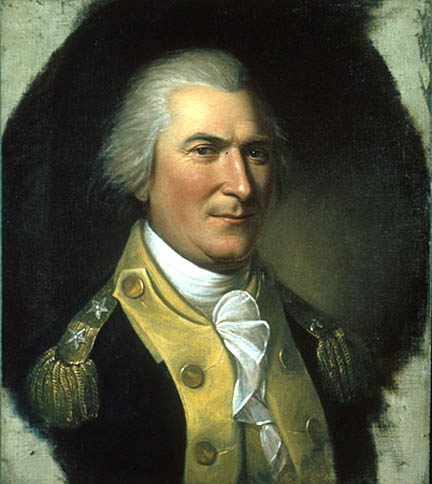About this Portrait:
In 1780, St. Clair commissioned a miniature (now unlocated) of himself from Charles Willson Peale. The artist painted a duplicate (now owned by the Metropolitan Museum of Art) for his own collection. A few years later, Peale added St. Clair's portrait to the Philadelphia Museum, possibly in honor of his rescue of the Fort Ticonderoga garrison. The museum portrait appears on the list published in the October 13, 1784 issue of the Freeman's Journal and Philadelphia Daily Advertiser.
Ownership History:
Listed in the 1795 Peale Museum catalog. Purchased by the City of Philadelphia at the 1854 Peale Museum sale.

|
|
|
|
 t. Clair was born in Caithness County, Scotland. He studied medicine at the University of Edinburgh and served part of an apprenticeship with the renowned anatomist, William Hunter. In 1757, St. Clair changed his career plans. He joined the British Army, and spent five years in Canada during the French and Indian War. He then purchased a substantial estate in western Pennsylvania and worked as the agent of the colonial governor. When the Revolution began, St. Clair joined the militia and fought at Trenton and Princeton. His controversial command of Fort Ticonderoga led to public criticism and a court-martial. Congress reinstated him within the year, and he later fought at Yorktown. t. Clair was born in Caithness County, Scotland. He studied medicine at the University of Edinburgh and served part of an apprenticeship with the renowned anatomist, William Hunter. In 1757, St. Clair changed his career plans. He joined the British Army, and spent five years in Canada during the French and Indian War. He then purchased a substantial estate in western Pennsylvania and worked as the agent of the colonial governor. When the Revolution began, St. Clair joined the militia and fought at Trenton and Princeton. His controversial command of Fort Ticonderoga led to public criticism and a court-martial. Congress reinstated him within the year, and he later fought at Yorktown.
 fter the war, St. Clair served two years in Congress and in 1787 was its president. He became Governor of the Northwest Territory. War began there over Native American treaty negotiations. The Miami chief, Little Turtle, decimated St. Clair's troops in a 1791 ambush near the Wabash River. Afterwards, St. Clair remained in the governor's office until President Thomas Jefferson removed him for his opposition to Ohio statehood in 1802. He then returned to Pennsylvania and published a defense of his conduct during the failed Northwest Territory campaign. St. Clair died on August 31, 1818. fter the war, St. Clair served two years in Congress and in 1787 was its president. He became Governor of the Northwest Territory. War began there over Native American treaty negotiations. The Miami chief, Little Turtle, decimated St. Clair's troops in a 1791 ambush near the Wabash River. Afterwards, St. Clair remained in the governor's office until President Thomas Jefferson removed him for his opposition to Ohio statehood in 1802. He then returned to Pennsylvania and published a defense of his conduct during the failed Northwest Territory campaign. St. Clair died on August 31, 1818.
|
|
|

